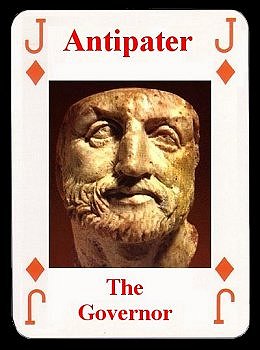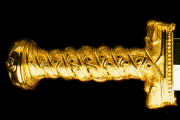



King Philip II
Prince Alexander
Queen Olympias
In the early fourth
century BC Macedonia rose to prominence as Europe’s most powerful nation. Although
ethnically distinct from the Greek realms to the south, Macedonia had absorbed much of Greek culture and even spoke its
language. The Greek world had reached a zenith of civilization over a
hundred years before. However, by the time Alexander’s father Philip II came to the Macedonian throne in 359 BC, Greece was a collection of declining city-states. Philip had ambitions to
unite them into a single kingdom under Macedonian control and one man above
all others helped him realize this goal: his senior general Antipater.
No one played a
greater role in shaping Alexander’s early life than Antipater. He was
intimate with the royal family and had a close personal friendship with
Philips’ wife, Queen Olympias.
When Alexander was born in 356 BC, some even suspected that Antipater was the
true father. He certainly showed a keen interest in Alexander’s education,
helped shape his military genius and eventually secured him the throne.
By 336 Philip had
gained control over much of Greece. However, in October that year he
was murdered by his chief bodyguard. It was never proved whether or not
the assassin acted alone but the murder left the country on the brink of
civil war. It was Antipater who made sure Alexander became king by
mustering the army behind the 21-year-old prince and saw to the elimination
of rival claimants. He was rewarded by being appointed supreme
commander of all the Macedonian forces in Europe.
In 334 BC, when Alexander
began his twelve-year campaign to conquer the Persian Empire,
Antipater remained behind as governor to secure the home front. During
this time Olympias’ relations with Antipater progressively deteriorated and
she eventually began to write to her son accusing him of conspiracy.
For a long time Alexander ignored her, but on his return to Babylon he decided to summon Antipater to court to answer the
charges. Antipater refused to go, claiming that he needed to remain in Europe as he feared a rebellion in Greece.
Instead, he sent son Cassander as an
emissary to explain his absence and to refute Olympias’ allegations.
Ancient writers, such as the Greek historian Plutarch,
referred to rumors some years later that Cassander was also sent with a
contingency plan to assassinate Alexander if he failed to convince him of his
father’s innocence, and that his brother Iolas, the royal butler, was
ultimately instructed to poison the king. Were these rumors true? Was
Antipater behind Alexander’s death?









